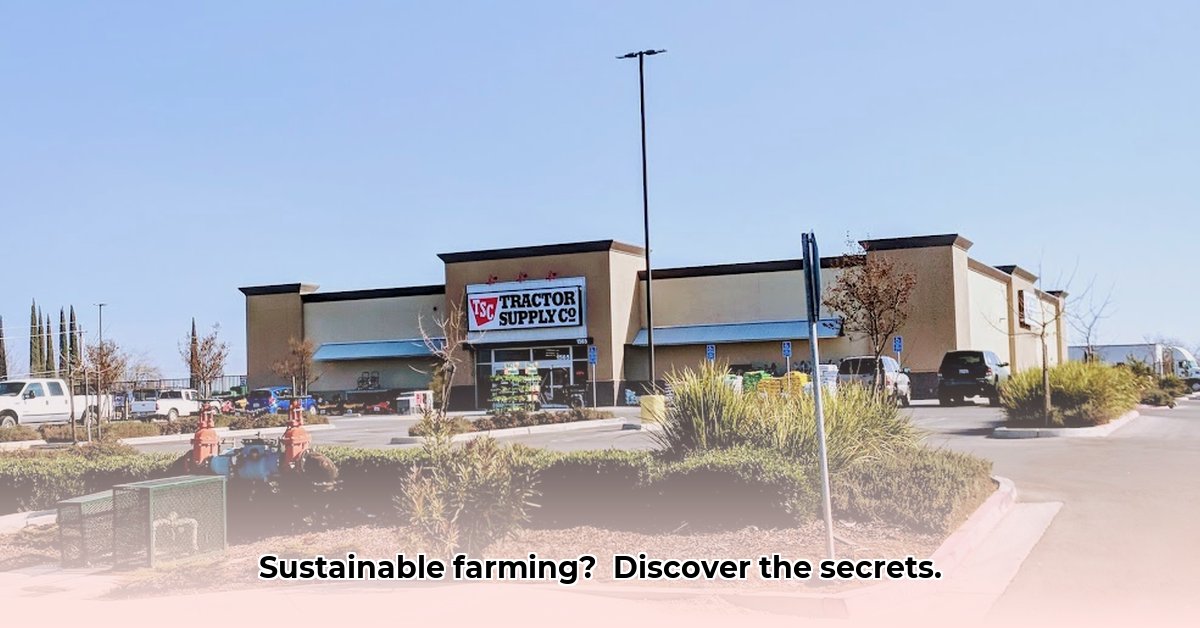
TSC's Product Portfolio and its Potential
Tractor Supply Company (TSC), while not explicitly known for its sustainability initiatives, offers a surprisingly diverse range of products that indirectly support sustainable agricultural practices. Their Middlefield location, in particular, provides access to these resources for local farmers and gardeners. The store stocks organic seeds, various livestock feeds formulated for animal health and reduced environmental impact, and water-efficient irrigation tools. These products offer pathways to more environmentally friendly farming methods. However, the connection between these items and sustainability is often implicit, rather than explicitly communicated to consumers. The lack of clear labeling and marketing around these eco-friendly options presents a significant untapped opportunity. For larger scale agricultural equipment needs, consider exploring options like Kubota equipment.
The Gap: Marketing and Sustainability
A key challenge lies in TSC’s lack of explicit sustainability marketing. While they offer a range of products that contribute to sustainable farming, this contribution remains largely unadvertised. This absence of clear messaging around sustainability hinders consumer awareness and limits the store’s potential to attract environmentally conscious customers. Many consumers actively seek out businesses aligned with their values; highlighting TSC’s existing sustainable product offerings could significantly increase sales and brand loyalty. A targeted marketing campaign emphasizing the environmental benefits of their product selection could resonate strongly with the growing number of consumers concerned about the origins and production methods of their food.
Community Impact and Regional Reach
TSC’s Middlefield location holds significant potential for impacting sustainable agriculture within the community. Its accessibility and the purchasing power of local farmers and gardeners create an ideal environment for promoting greener practices. While precise measurements of TSC’s impact require detailed sales data analysis, certain indicators suggest a positive trend. For example, increased sales of organic seeds may indicate rising regional interest in organic farming, similarly, a growth in sales of water-efficient irrigation tools could reflect wider adoption of more sustainable water management. These trends, while indirect, present promising signs of positive change within the community.
Actionable Steps for Stakeholders
To maximize TSC’s positive contribution to sustainable agriculture, targeted actions are needed from various stakeholders:
For TSC Management:
- Conduct comprehensive market research: Utilize surveys, focus groups, and sales data analysis to understand customer demand for sustainable products and tailor future product selection and marketing accordingly.
- Develop a long-term sustainability strategy: This strategy should encompass responsible sourcing, eco-friendly packaging, and transparent communication of the environmental benefits of their product offerings. Public commitment to this strategy will build trust and credibility with consumers.
- Forge partnerships with suppliers: Collaborate with suppliers committed to sustainable practices to ensure the consistent availability of high-quality, environmentally responsible products.
For Local Farmers:
- Actively explore TSC's resources: Thoroughly investigate the full range of products offered at TSC to discover how they can support the transition to more sustainable agricultural methods. This may include exploring options like organic feed, water-efficient irrigation, and alternative pest control methods.
- Provide direct feedback: Communicate directly with TSC management to suggest specific sustainable products that could better meet the needs of local farmers.
For Consumers:
- Make informed choices: Actively select sustainable options when shopping at TSC. This consumer behavior sends a clear signal to the store regarding the demand for eco-friendly products.
- Engage in word-of-mouth marketing: Recommend sustainable products from TSC to friends and neighbors, fostering a supportive community approach to sustainability.
For Local Government:
- Partner with TSC on community initiatives: Collaborate on programs promoting sustainable agriculture, such as community gardens or educational workshops on sustainable farming practices.
- Incentivize sustainable farming practices: Explore incentives like tax breaks or grants for local farmers who adopt sustainable methods and source supplies from TSC.
Risk Assessment and Mitigation
Embracing more sustainable practices presents potential risks for TSC:
| Risk Factor | Likelihood | Impact | Mitigation Strategy |
|---|---|---|---|
| Low consumer demand | Medium | Medium | Targeted marketing campaigns, educational outreach programs |
| Higher product costs | Low | High | Explore partnerships with suppliers to secure competitive pricing |
| Specialist competition | High | Medium | Differentiate through strong community engagement and local sourcing |
| Supply chain disruptions | Medium | High | Diversify suppliers, build relationships with local producers |
Regulatory Landscape
The regulatory landscape surrounding sustainable agriculture and product labeling is currently evolving. TSC must monitor and adapt to future regulatory changes to ensure compliance and maintain competitiveness. Proactive monitoring of impending regulations is crucial for long-term success.
Conclusion
Middlefield Tractor Supply possesses significant potential to become a key contributor to sustainable agriculture within its community. By strategically addressing the challenges, leveraging existing opportunities, and fostering collaboration amongst stakeholders, TSC can significantly enhance its positive environmental impact. Clear communication, a shared commitment to sustainability, and a proactive approach are crucial elements in creating a more sustainable future for Middlefield and beyond.